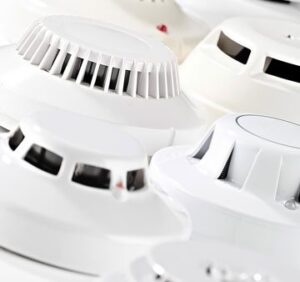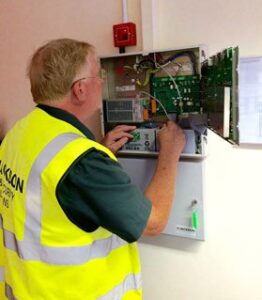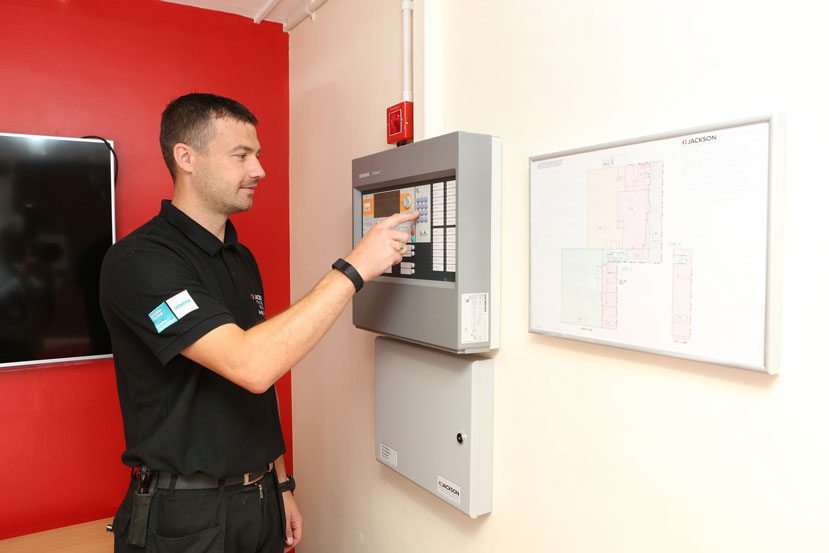
You want to keep people safe from fire in your workplace. So you decide to go ahead with a
fire alarm installation. Let’s fast forward. The system’s in. The commissioning engineer’s tested it and given you a commissioning certificate. Mission accomplished? No – but it’s an assumption made by many businesses we’ve come across. It’s a worrying situation because it leaves them - and potentially you - very vulnerable.
The purpose of commissioning - and its limits
When you decide to have a fire alarm, there are 3 key stages involved. The design. The installation. Then the commissioning.
The commissioning process involves the thorough testing of the installation to the recommendations of the appropriate
British Standard - BS 5839 Part 1. The commissioning engineer should confirm that all is ok with the system and do the handover so you know how to use it. They’ll also provide a certificate to confirm it’s been commissioned.
But many businesses think that equates to a full certification of the system against BS 5839. And quite simply, it doesn’t.
Commissioning tells you the engineer’s tested the system and it works. But it doesn’t certify that the design was correct in the first place. It doesn’t tell you it was correctly installed by an electrician with expert knowledge of BS 5839. It doesn’t confirm that the equipment itself was manufactured to the right standard. And so on.
The fact is problems can arise all the way down the line. And this is why you need to have both the design and installation of the system separately certified too. Many businesses assume the existence of a commissioning certificate on its own is the evidence needed if something did happen but it’s not. It’s vital you have each stage certified and then the complete system verified to confirm it’s been put together correctly and is working according to the original specification. And actually, verification goes beyond that. It also acts as a check that the original spec remains the right one – for example, there might have been an alteration to the building or use of the space within it since then.
 Is this really an issue you should be concerned about?
Is this really an issue you should be concerned about?
You might be thinking this isn’t a big issue. Surely if the system’s working, the chances are it’ll be fine?
Well, let’s revisit those standards and legal obligations -we’ve already mentioned BS 5839 Part 1. It’s the British Standard that relates to fire detection and fire alarm systems for buildings; specifically, it’s the code of practice for design, installation, commissioning and maintenance of systems in non-domestic premises. It’s a standard, not a regulation. But, as in many cases, compliance with the standard often means you’re compliant with the relevant legislation. And that legislation is set out in the shape of the Regulatory Reform (Fire Safety) Order for England and Wales, the Fire (Scotland) Act and the Fire Safety Regulations (Northern Ireland). Who does it specify as the responsible person when it comes to fire safety in your business? Very possibly you. Certainly someone in your business.
As the responsible person, the duty of care lies with you to make sure the system’s been verified. You are required to do everything you can to ensure the competence of those carrying out the work. You are the one who’s obliged to make sure you have every stage signed off and certified.
Fire alarm systems manufacturer Siemens works in partnership with Jackson Fire and Security. The lack of understanding about the responsibilities around verification is a real concern to them.
‘Understandably an end user is not going to be an expert in fire alarm systems - it’s a purchase they’ll probably only make once or twice,’ explains Siemens Head of Fire Products Derrick Hall. ‘They could well make their choice assuming the company they’re buying from will take care of everything for them in terms of complying with legislation and standards. In many instances, that just isn’t the case.’
So what can you do to make sure you’re fulfilling your duty of care?
Verification can be done by a qualified competent independent third party and this is where
BAFE accreditation can provide you with significant reassurance.
A company registered to BAFE Fire Detection and Alarm Systems (SP203-1) can help you with the design, installation, commissioning and maintenance of your fire alarm system to the required British Standard. Certificates issued by these companies upon completion of each stage of work ultimately contribute to the overall BAFE Certificate of Compliance at the point of verification. They provide proof of competence and give you (and relevant regulating authorities and insurers) proof the work’s been correctly undertaken. It’s confirmation of that company’s competence and commitment to quality. It’s evidence that you’re taking your duty of care seriously.
Derrick comments ‘Jackson Fire and Security has invested a great deal of effort in securing BAFE accreditation to make sure it’s getting the quality absolutely right and protecting its clients. Siemens supports that ethos by training their engineers in our products and making sure they’re fully competent in their use.’
So do your checks. Use companies that will help you fulfil your obligations. If you’d like to know more – including what to do if your alarm system is already installed but might not have been verified-
get in touch with us.
 You want to keep people safe from fire in your workplace. So you decide to go ahead with a fire alarm installation. Let’s fast forward. The system’s in. The commissioning engineer’s tested it and given you a commissioning certificate. Mission accomplished? No – but it’s an assumption made by many businesses we’ve come across. It’s a worrying situation because it leaves them - and potentially you - very vulnerable.
The purpose of commissioning - and its limits
When you decide to have a fire alarm, there are 3 key stages involved. The design. The installation. Then the commissioning.
The commissioning process involves the thorough testing of the installation to the recommendations of the appropriate British Standard - BS 5839 Part 1. The commissioning engineer should confirm that all is ok with the system and do the handover so you know how to use it. They’ll also provide a certificate to confirm it’s been commissioned.
But many businesses think that equates to a full certification of the system against BS 5839. And quite simply, it doesn’t.
Commissioning tells you the engineer’s tested the system and it works. But it doesn’t certify that the design was correct in the first place. It doesn’t tell you it was correctly installed by an electrician with expert knowledge of BS 5839. It doesn’t confirm that the equipment itself was manufactured to the right standard. And so on.
The fact is problems can arise all the way down the line. And this is why you need to have both the design and installation of the system separately certified too. Many businesses assume the existence of a commissioning certificate on its own is the evidence needed if something did happen but it’s not. It’s vital you have each stage certified and then the complete system verified to confirm it’s been put together correctly and is working according to the original specification. And actually, verification goes beyond that. It also acts as a check that the original spec remains the right one – for example, there might have been an alteration to the building or use of the space within it since then.
You want to keep people safe from fire in your workplace. So you decide to go ahead with a fire alarm installation. Let’s fast forward. The system’s in. The commissioning engineer’s tested it and given you a commissioning certificate. Mission accomplished? No – but it’s an assumption made by many businesses we’ve come across. It’s a worrying situation because it leaves them - and potentially you - very vulnerable.
The purpose of commissioning - and its limits
When you decide to have a fire alarm, there are 3 key stages involved. The design. The installation. Then the commissioning.
The commissioning process involves the thorough testing of the installation to the recommendations of the appropriate British Standard - BS 5839 Part 1. The commissioning engineer should confirm that all is ok with the system and do the handover so you know how to use it. They’ll also provide a certificate to confirm it’s been commissioned.
But many businesses think that equates to a full certification of the system against BS 5839. And quite simply, it doesn’t.
Commissioning tells you the engineer’s tested the system and it works. But it doesn’t certify that the design was correct in the first place. It doesn’t tell you it was correctly installed by an electrician with expert knowledge of BS 5839. It doesn’t confirm that the equipment itself was manufactured to the right standard. And so on.
The fact is problems can arise all the way down the line. And this is why you need to have both the design and installation of the system separately certified too. Many businesses assume the existence of a commissioning certificate on its own is the evidence needed if something did happen but it’s not. It’s vital you have each stage certified and then the complete system verified to confirm it’s been put together correctly and is working according to the original specification. And actually, verification goes beyond that. It also acts as a check that the original spec remains the right one – for example, there might have been an alteration to the building or use of the space within it since then.
 Is this really an issue you should be concerned about?
You might be thinking this isn’t a big issue. Surely if the system’s working, the chances are it’ll be fine?
Well, let’s revisit those standards and legal obligations -we’ve already mentioned BS 5839 Part 1. It’s the British Standard that relates to fire detection and fire alarm systems for buildings; specifically, it’s the code of practice for design, installation, commissioning and maintenance of systems in non-domestic premises. It’s a standard, not a regulation. But, as in many cases, compliance with the standard often means you’re compliant with the relevant legislation. And that legislation is set out in the shape of the Regulatory Reform (Fire Safety) Order for England and Wales, the Fire (Scotland) Act and the Fire Safety Regulations (Northern Ireland). Who does it specify as the responsible person when it comes to fire safety in your business? Very possibly you. Certainly someone in your business.
As the responsible person, the duty of care lies with you to make sure the system’s been verified. You are required to do everything you can to ensure the competence of those carrying out the work. You are the one who’s obliged to make sure you have every stage signed off and certified.
Fire alarm systems manufacturer Siemens works in partnership with Jackson Fire and Security. The lack of understanding about the responsibilities around verification is a real concern to them.
‘Understandably an end user is not going to be an expert in fire alarm systems - it’s a purchase they’ll probably only make once or twice,’ explains Siemens Head of Fire Products Derrick Hall. ‘They could well make their choice assuming the company they’re buying from will take care of everything for them in terms of complying with legislation and standards. In many instances, that just isn’t the case.’
So what can you do to make sure you’re fulfilling your duty of care?
Verification can be done by a qualified competent independent third party and this is where BAFE accreditation can provide you with significant reassurance.
A company registered to BAFE Fire Detection and Alarm Systems (SP203-1) can help you with the design, installation, commissioning and maintenance of your fire alarm system to the required British Standard. Certificates issued by these companies upon completion of each stage of work ultimately contribute to the overall BAFE Certificate of Compliance at the point of verification. They provide proof of competence and give you (and relevant regulating authorities and insurers) proof the work’s been correctly undertaken. It’s confirmation of that company’s competence and commitment to quality. It’s evidence that you’re taking your duty of care seriously.
Derrick comments ‘Jackson Fire and Security has invested a great deal of effort in securing BAFE accreditation to make sure it’s getting the quality absolutely right and protecting its clients. Siemens supports that ethos by training their engineers in our products and making sure they’re fully competent in their use.’
So do your checks. Use companies that will help you fulfil your obligations. If you’d like to know more – including what to do if your alarm system is already installed but might not have been verified- get in touch with us.
Is this really an issue you should be concerned about?
You might be thinking this isn’t a big issue. Surely if the system’s working, the chances are it’ll be fine?
Well, let’s revisit those standards and legal obligations -we’ve already mentioned BS 5839 Part 1. It’s the British Standard that relates to fire detection and fire alarm systems for buildings; specifically, it’s the code of practice for design, installation, commissioning and maintenance of systems in non-domestic premises. It’s a standard, not a regulation. But, as in many cases, compliance with the standard often means you’re compliant with the relevant legislation. And that legislation is set out in the shape of the Regulatory Reform (Fire Safety) Order for England and Wales, the Fire (Scotland) Act and the Fire Safety Regulations (Northern Ireland). Who does it specify as the responsible person when it comes to fire safety in your business? Very possibly you. Certainly someone in your business.
As the responsible person, the duty of care lies with you to make sure the system’s been verified. You are required to do everything you can to ensure the competence of those carrying out the work. You are the one who’s obliged to make sure you have every stage signed off and certified.
Fire alarm systems manufacturer Siemens works in partnership with Jackson Fire and Security. The lack of understanding about the responsibilities around verification is a real concern to them.
‘Understandably an end user is not going to be an expert in fire alarm systems - it’s a purchase they’ll probably only make once or twice,’ explains Siemens Head of Fire Products Derrick Hall. ‘They could well make their choice assuming the company they’re buying from will take care of everything for them in terms of complying with legislation and standards. In many instances, that just isn’t the case.’
So what can you do to make sure you’re fulfilling your duty of care?
Verification can be done by a qualified competent independent third party and this is where BAFE accreditation can provide you with significant reassurance.
A company registered to BAFE Fire Detection and Alarm Systems (SP203-1) can help you with the design, installation, commissioning and maintenance of your fire alarm system to the required British Standard. Certificates issued by these companies upon completion of each stage of work ultimately contribute to the overall BAFE Certificate of Compliance at the point of verification. They provide proof of competence and give you (and relevant regulating authorities and insurers) proof the work’s been correctly undertaken. It’s confirmation of that company’s competence and commitment to quality. It’s evidence that you’re taking your duty of care seriously.
Derrick comments ‘Jackson Fire and Security has invested a great deal of effort in securing BAFE accreditation to make sure it’s getting the quality absolutely right and protecting its clients. Siemens supports that ethos by training their engineers in our products and making sure they’re fully competent in their use.’
So do your checks. Use companies that will help you fulfil your obligations. If you’d like to know more – including what to do if your alarm system is already installed but might not have been verified- get in touch with us. 